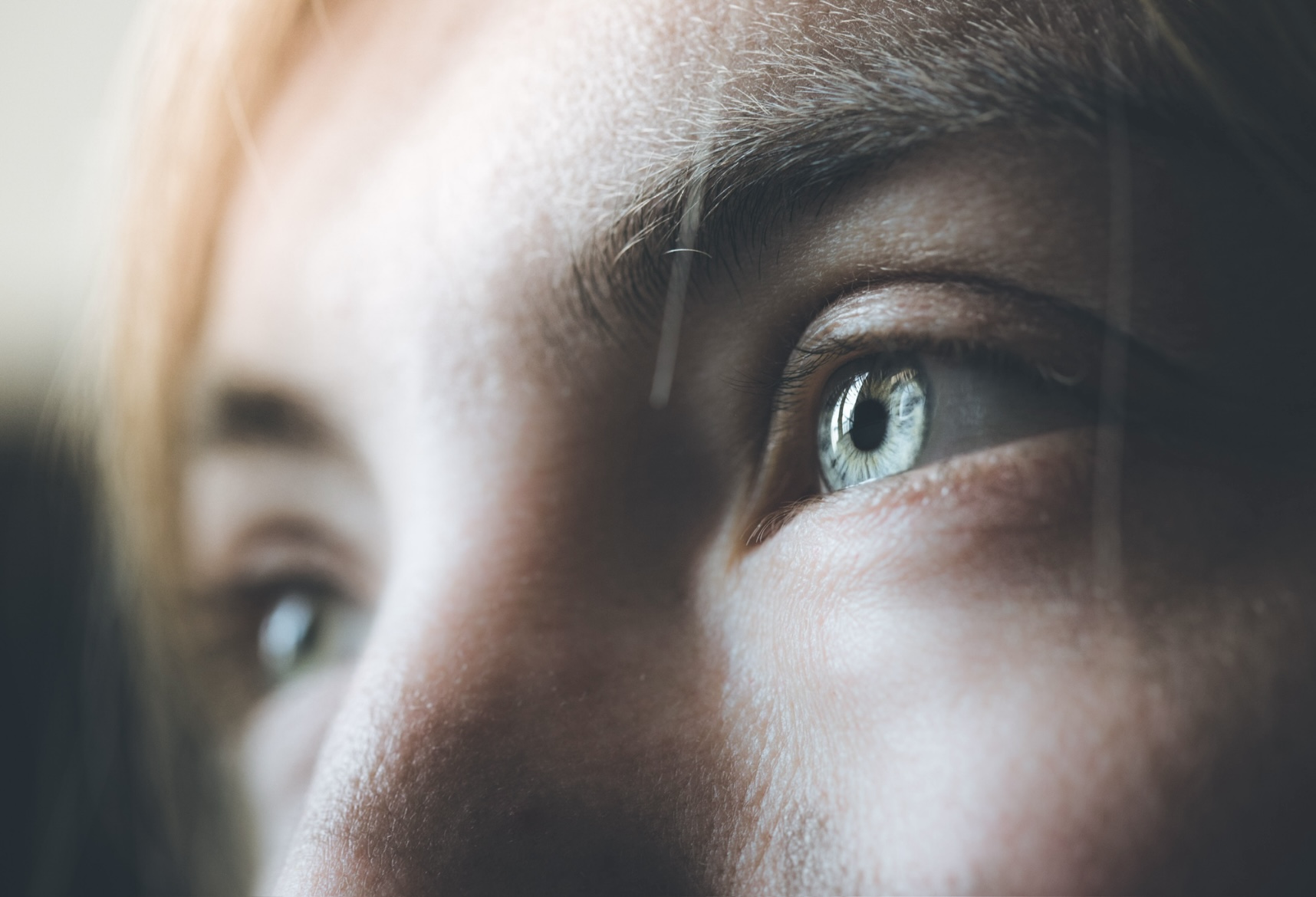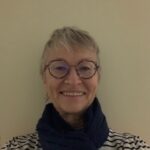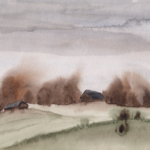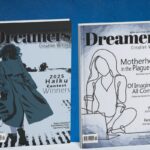– Nonfiction by Ruth Patterson –
Featured in Issue 20 of Dreamers Magazine and Honourable Mention in the 2025 Sense of Place & Home Contest

*Lehed juba kolletasid puul
Kuivi heinakōrsi kandis tuul
Oma pambukese vōtsin kaenla alla
Viimast korda tegin kodu ukse valla
Saatus toimus väga karmilt minuga
Pidin maha jätma oma kodumaa
Autumn leaves glowed yellow on the tree
When fate dealt so harshly with me
Wild winds whipped the haystacks dry
I left my village, no time for goodbye
Now my homeland is behind a closed door
Can it ever be opened? Why this war?
I pick up this morning’s newspaper and read another article about displaced Ukrainians, whose lives have been upended by a war instigated by Russia. There is something about the accompanying photos that looks familiar. Those hopeful eyes—for a new life in a peaceful country. Those sad eyes—for everything they have left behind.
I remember my mother’s blue eyes, behind her brown tortoiseshell glasses, the way she looked my father straight in the eye. Her silent no-fooling-around stare was her stern admonishment for whatever misdeed he had been guilty of that day.
This happened most often at our family cottage in the lower Laurentians north of Montreal. My father would arrive there late Friday night in the summer, drop off groceries and bags in the kitchen, and then drive off to a local farmer’s barn to smoke, drink and play bridge — a penny a point— with other Estonian men, all refugees like him. Just before sunrise, my sister and I heard him staggering to his bedroom. He invariably woke up my aunt, who slept in the kitchen. Then we’d hear an indignant screech from our family cat whose tail had been flattened–Puddy always seemed to get in his way.
My mother’s eyes flashed a dangerous silver those Saturday mornings, her lips a thin line, as if stretched by invisible elastics. My father pleaded for her understanding of his need to decompress after a long week of work, but my usually loquacious mother had turned into a woman of no words. She’d likely learned this strategy from her own mother, Juulia, who’d given my grandfather Jaan the same silent treatment when he came home late and lurching after playing the kannel, his Estonian zither, in the village band. As the tenth and last child of Juulia and Jaan, my mother had been the only one still living at home to witness those transgressions and the response they had elicited.
My sister and I huddled together under the bed covers until our misbehaving father found refuge in the vegetable garden. He stabbed at the earth with a pitchfork—first angrily, then gradually more contentedly— to unearth a few potatoes for dinner. We breathed again when he deposited the potatoes with my aunt in the kitchen, and they started a conversation about a neutral topic, like what to cook for dinner or whether we should swim in the river before or after lunch.
In another of my memories, my mother was sitting around the bonfire with our cottage neighbours, her dark eyes reflecting the moonlight. She was singing the songs of her childhood, while my father played the accordion. Like many of the adults, my parents had cigarettes wedged between the index and middle fingers of one hand, and a glass of Canadian whiskey or gin in the other. I peeked out from between the legs of my parents, and watched the sparkling embers glow red, as I lay spreadeagled on a blanket and rubbed the smoke from my eyes. As the stars appeared in the night sky and the dampness crept into my body, I hoped no-one remembered that it was hours past my bedtime.
My mother’s eyes were always darting, back and forth, at our family parties and holiday dinners. Her right foot was tense, ready to administer a firm kick when my father’s conversation got off topic or when discussions with sons-in-law or guests got too heated or political. My father’s defence of nuclear energy never sat well with us young environmentalists, but it turned out he was more prescient than we thought. We never did find out what my mother thought, as she was too busy scanning the room for danger, the air electric with the current of her disapproval. The hearty meals of pork and sauerkraut that she served—and the shots of vodka that were downed—usually eased the tension.
When my sister and I decided to get married within three months of each other, my mother, who by now had lost both parents and all but one of her nine siblings, was faced with the loss of two daughters. Although the word “depression” was not in anyone’s vocabulary in those days, I remember her eyes were often dull or full of tears in the months leading up to those two weddings. My father took her silences in his stride, and put himself in charge of most of the preparations. As a mechanical engineer and list maker par excellence, he seemed to have no difficulty orchestrating guest, food and drink lists. The Estonian minister that he hired was able to do “two for the price of one”( or at least, that’s what my sister and I imagined, as my thrifty father was always looking to save money).
A couple of decades later, my mother’s eyes sparkled as we regaled each other with stories about our day. The year was 1990, and the two of us were celebrating her 65th birthday with a trip back to Estonia, newly independent after Gorbachev’s perestroika. We were staying in Vōrumaa, my mother’s birthplace, where we visited with her people, saw her landscapes and I heard her stories.
Relatives she had not seen during the fifty years that Estonia was part of the repressive Soviet Union had invited us to their home. Time and history had not been kind to them. Former farmers, before the collectivization of all farms and the prohibition of private property ownership, they had been reduced to living in an unpainted wooden bungalow, with a small backyard where they kept chickens and beehives. We spent the afternoon listening to fifty years worth of stories, perched on a dusty couch in their tiny living room, while escaped bees crawled in through the uninsulated cracks and floorboards and made their way drowsily across the carpet.
“You were covered with a hundred bees, and the rest were buzzing around on the floor at our feet. I was wondering how long before we were stung to death? ” I asked my mother.
“ I was so busy trying to understand Maida’s thick Vōrumaa dialect that I barely noticed the bees. I wish we had brought a tape recorder,” my mother said wistfully. “Such juicy stories, and I’d almost forgotten how to speak Vōru”.
Her eyes were animated. She spoke clearly and confidently. This mother was different from the one I knew back in Canada. Suddenly I could see her as the beautiful young high school graduate, who’d dreamed of going to medical school. I could see why the young German army officer would have agreed to smuggle her, her sister and her mother onto a munitions train to safety in Germany. I could only admire this lively new woman in front of me.
In later years, when her mind was often full of the bad memories, my mother’s eyes were tired. Once again, she and my father did not want to talk about depression, even though there were many days when she avoided getting dressed. Refugees of their generation had no time to be depressed. They were too busy building new lives wherever they’d had the good fortune to be accepted. But over 60 years later, my mother’s many losses and disappointments were still sinking in.
“Ma ei ole kibe” “(I’m not bitter)”. Her eyes flashed angrily again. “Ma olen kibestunud” “(I’m embittered!)”. She emphasized the difference between those two Estonian words.
She then listed all the unfair things that had happened in her life because of the war.
“I never finished medical school. I never said goodbye to my father when we left Estonia. I didn’t even hug him. How could I have been such an awful daughter?”
I didn’t know how to answer this question. I’d never met my grandfather Jaan. He was a shadow figure to me. He had not joined his wife and two daughters in the line of refugees making their way to the German border.
“Stuck behind the Iron Curtain, because of his stubbornness,” my aunt had said.
I tried to understand how this happened. Perhaps he could not have imagined a life anywhere else but in his village? Maybe he had been afraid of moving?
As a child, I imagined the Iron Curtain as a real curtain made of some kind of metallic substance that was preventing my grandfather from getting out of his house. I thought that was why he would never come to visit us. I didn’t yet understand why he never wrote or called my mother and why she never called or wrote to him. Only years later, after his death, did I understand that any contact with family members who had escaped to the west would have resulted in imprisonment or exile to the dreaded Gulag in Siberia. This had happened to my father’s family.
Another couple of decades pass, and I am at the hospital with my mother. She no longer speaks, but her open eyes tell me she’s still alive. I hold her hand as the ventilator helps her breathe and the hydromorphone takes effect. I think she can still hear and understand me, but I don’t know for sure. I alternate between whispering “Ma armastan Sind” “ (I love you)” and “Oled hea ema” “(You’ve been a good mother)”. I repeat these words over and over again, like a mantra, not knowing what else to say. I know she is in the last hours of her life.
When my sister arrives from Vancouver to take her place in this last vigil, my mother’s body seems to relax. Her eyes finally close, the room is silent. I keep repeating the mantra in my head as I let go of that familiar hand, give that familiar body one last hug. I’m sure my mother’s gaze still follows me, even though her eyes are no longer open.
A year later, my sister and I take my mother’s ashes for burial in a hilltop graveyard above a peaceful lake in Urvaste, near her birthplace in southern Estonia. Her name is etched on our family gravestone, joining those of my father, my aunt, two of my uncles and both my grandparents. Despite all the challenges and disappointments in her life, I know my mother is in a place where she is still remembered. Where the wind rustles through birch trees and a chorus of nightingales sings in the evening. Where we, our sons and maybe our grandchildren will visit from time to time.
*Väike majakene põllu sees
Soo ja männimets ta õue ees
Seal ma mööda saatsin noorus a’a
Seal mu kuldne mälestuste maa
A tiny house, in a boggy field
Fragrant pine trees were my shield
Mine was a childhood with no fear
In that golden land, forever dear
I still read the newspaper every day, and continue to be moved by stories of war and displacement. I contribute to organizations that help refugees, especially those in Canada and Estonia. I have befriended a young Ukrainian family in our town who hope to settle here permanently.
These are small gestures in today’s complex world of migration and immigration, but if my mother’s eyes are watching me, I hope she would be proud.
*NOTE FROM THE AUTHOR: The Estonian poems at the beginning and end of this memoir were in my mother’s collection and likely written by her. I have done my best to translate them into English.
About the Author – Ruth Patterson

Ruth Patterson, a retired speech-language pathologist, enjoys writing both prose and poetry in community. In 2022, she co-founded the writers’ group INKlings at the Whitchurch-Stouffville Public Library in Ontario and co-edited the anthology “In the Vale”, with generational stories about the hamlet of Vale Perkins, Quebec.
Like reading print publications? Consider subscribing to the Dreamers Magazine!

Last chance! Stories of Place, Home, and the Meaning of Dreaming
The deadline for the Dreamers Writing Contest on place and home is January 31. Submit a heartfelt story, poem, or essay reflecting on belonging, memory, displacement, or the meaning of home. Open internationally. $250 CAD prize and publication.

Editor’s Note: Issues 21 and 22
We’re pleased to announce the simultaneous release of Dreamers Magazine Issues 21 and 22.These two issues were shaped during very different moments…